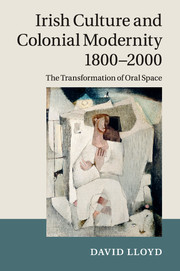Chapter 4 - ‘Going nowhere’
oral space in the cell block
Published online by Cambridge University Press: 07 October 2011
Summary
I
The events surrounding the struggle of Republican prisoners in Northern Ireland for political status, from the mid 1970s to the hunger strike of 1981, have a logic to them that unfolds with a seemingly inexorable fatality. In the wake of violent police reactions to the Civil Rights movement of the late 1960s, conflict in Northern Ireland rapidly escalated from street protests into organized armed struggle. The British Army initially responded to the conflict in a framework based on colonial counter-insurgency campaigns it had fought elsewhere in the post-war period, including Malaysia, Kenya and Cyprus, campaigns in turn partly shaped by previous insurgencies in Ireland. Among the strategies adapted from those ‘low-intensity’ campaigns was internment, implemented in Northern Ireland in August 1971. Numerous suspected Republican activists were incarcerated, including some who were neither paramilitaries nor, in many cases, politically involved at all. Most internees were subjected to ‘in-depth’ interrogation, a practice examined in the following chapter, and committed to extended incarceration without trial. The number of internees eventually reached more than 2,300.
On account of the counterproductive politicizing effect of such mass intrusions, predominantly into Catholic and nationalist communities, British policy-makers increasingly turned to using the courts as a means of convicting and confining those suspected of terrorist offences. Whereas internment indirectly recognized the colonial nature of the conflict, use of the court system began the gradual effort to recast it as a law-and-order problem. Nonetheless, between 1972 and 1975, as a result of a hunger strike by Republicans, paramilitary prisoners were granted ‘Special Category’ status. Effectively recognizing the political motivation of their offences, and therefore the political nature of the conflict, Special Category status allowed for the segregation of prisoners in separate compounds according to their ideological and organizational affiliations and for free association within the compounds. These conditions permitted education and training to take place alongside sporting and other recreational activities. The prison regime of the camps at Long Kesh, colloquially known as the Cages, also recognized the command structure of the paramilitary organizations. In 1976, however, the British government radically changed its counter-insurgency policy in Northern Ireland, and decided to regard all terrorist acts as ordinary crimes rather than as politically motivated offences. The policy of ‘criminalization’, which belonged with a larger strategy of seeking to ‘normalize’ life in Northern Ireland and to cast the violence as an apolitical question of law and order, was clearly designed to delegitimate the IRA and other paramilitary groups and to deny the colonial roots of the conflict. Men convicted in the special or Diplock courts from 1976 were to be incarcerated as ordinary criminals in the purpose-built Maze Prison at Long Kesh, a complex of cellular blocks that became known as the H-Blocks on account of the way in which the wings were arranged around a central administrative ‘bar’. Women were held in the older cellular prison at Armagh where they were, as in other female prisons, allowed to wear their own or civilian-type clothing.
- Type
- Chapter
- Information
- Irish Culture and Colonial Modernity 1800–2000The Transformation of Oral Space, pp. 116 - 165Publisher: Cambridge University PressPrint publication year: 2011



